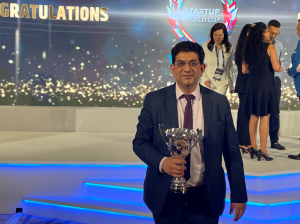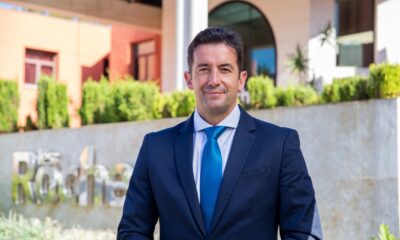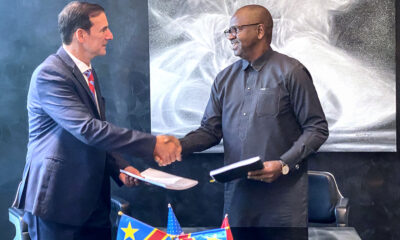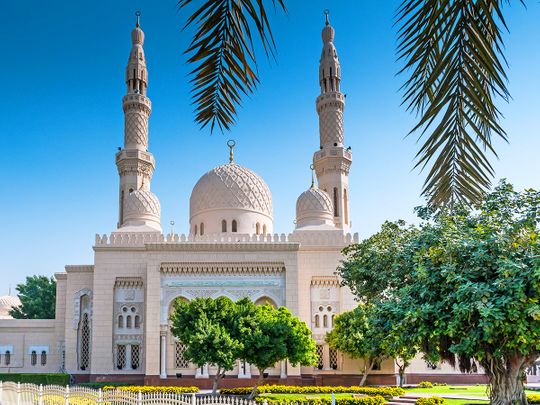Headline staff
The two-day 35th World AI Show, the longest running event in artificial intelligence kicked off in style and ended with the UAE finalist chosen for the Startup World Cup in Dubai on Wednesday.
Affinsys, a startup running AI solutions for banks, telecom and insurance companies, won out of a shortlist of six yesterday after the jury took a live decision based on final pitches and voted for UAE’s representation among 60-plus countries from where the World Cup winner will receive $1 million funding.
Making the presentation and receiving the award was Aditya Bhagat, who co-founded the company three years back with friend and fellow banker Surya Prasad. “I am extremely honoured to get this reward,” said a beaming Bhagat immediately after. “We have been associated with the Dubai Future Program and also received many accolades and awards, so we are on the right track.
“We need 3-4 million of funding for our expansion programme and if all goes well in September (for the Startup World Cup final round), this will be a big help.”
Meanwhile, the day featured a lot of brainstorming on problems, solutions and what the future holds in various aspects of artificial intelligence. With delegates being served tea and refreshments by robotic machines doubling up as hostesses at the Jumeirah Emirates Towers, attendees had a field day imbibing the latest trends and exploring future opportunities to collaborate.
The event started smoothly with the focus on AI in transport where speakers discussed ‘transforming cities to autonomous mode’ and everyone agreed that the challenges remain on ground outside of driverless cars or semi-automatic modes, than the vehicles themselves.
“Planes have been using auto-pilot technology for something like 70 years so we have come a long way,” said Seham El Behissy, former Renault general manager, digital and connected cars. “But on the road there are other elements and each one brings with it its own challenges. Then it is also about the data in real time, it has to be good, it depends on how the user is trained to use it and the user himself and then his interaction with other users.”

Aditya Bhagat is a former banker and co-founder of Affinsys. Trescon Global
Author of research papers and an expert, El Behissy shared the dias with Dr Jassim Haji, president of International Group of Artificial Intelligence and who is working with road authorities in Bahrain and Angad Singh, the global director for innovation at Aramex.
AI with human touch
Noor Alnahhas, the CEO of nybl, another alumni of the Dubai Future Accelerators programme, gave the keynote speech and took the conversation beyond the day’s agenda on a thoughtful note.
“In the past, more was key to everything. If you wanted more oil, drill more. If you are hungry, produce more food … but now, it is less. If you want to save the climate, consume less of many things, we are trying to towards zero carbon footprints.
“If we can tie the development to betterment of human life, investment is not a question. Everyone here will talk about technology and their USPs. But it is important for all to think how to come together to make lives better. Like six weeks ago, we have collaborated with the International Humanitarian City how to deliver aid and relief items faster and better.”
Saeed Alhebsi, the advisor in the AI ministry of Human Resource and Emiratisation spoke about the UAE’s Fourth Industrial Revolution strategy framework.
CNN global director Rachele Peterson moderated a panel of experts on the use cases of AI, future implementation strategies of digital transformation, challenges in current practices and real-life examples on how the experts are solving them.
All had various focus areas to approach but many agreed that unless the masses do not buy-in on the prospects, the growth rate will be hampered. Yet, Wees Abraham of Elekron Ventures warned against jumping on to the AI bandwagon because others are. “Get a consultant, but you need to have someone in the team to own it otherwise you will be sold something you never need. Technology has to be your slave, not the other way around.”
Many speakers across different sessions touched on the positive impact of AI in the times of Covid-19. “Pandemic has changed how we look at productivity, no doubt,” said Amina Abdul Rahim, head of IT in the engineering office of Sheikh Mohammed bin Rashid Al Maktoum.
Day Two of the WAIS will feature an awards ceremony to celebrate some of the achievers in the field. Those wishing to attend can walk in or register here.

 Announcements6 months ago
Announcements6 months ago
 Announcements5 months ago
Announcements5 months ago
 Sports5 months ago
Sports5 months ago

















